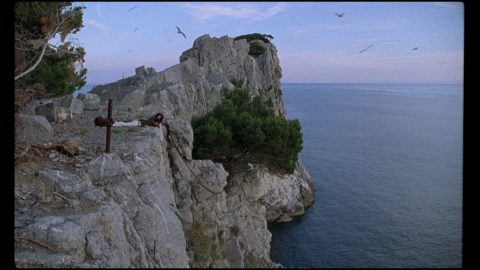Memory is an endless archive in Sara Fgaier’s Weightless (2024). An archive tainted by the prejudices of our collective experiences. Incomplete. Inconsistent. Inaccurate. But just as the job of the archivist is a painful, painstaking one with many rewards in store, amidst the limitless records lie veritable bounties.
Gian’s (Andrea Renzi) most treasured moment is a beach in Tunisia, an isolated and rocky inlet, marked by clear blue water and the sound of a passing cargo train. It’s a moment captured on camera by a passing tourist. He sits next to his French lover, Leila (Lise Lomi), relaxed as ever. Did they know at the time, the significance of this moment? That this casual affair would blossom into a decades-long romance?
Does Gian even remember it at all? Caught in stilted scenes, the Italian Weightless opens with Leila’s funeral, Renzi capturing the impossibly heavy burden of grief with weighed-down body language. The loss of his wife has given him amnesia, which is both the theme of the film and its stylistic springboard; allowing Fgaier to play around with form as Gian searches through the personal archive in search of his great love.
At first, I thought Fgaier’s excellent debut would be plodding and slow. Perhaps even forbidding. But through the otherwordly sounds of a Stambeli song — a female-led type of Tunisian music that’s associated with rituals and trance states — the ethnomusicologist is led down a series of interlocking, gorgeously rendered memories, foregoing a traditional narrative in favour of a moving reverie on love, memory and the beauty of remembering.
Shot in 1:66:1 — native to Super 16 and suitable for capturing the Mediterranean’s eclectic mix of sunny climes and Greco-Roman aesthetics — Weightless blends a wide variety of film stocks, exposure levels, colours and contrasts — even fitting in archive footage such as silent films and black-and-white shots — taking us on an epic yet personal journey through Gian’s memories.
With not much in the way of narrative, Weightless, triggered by the recovery of an old diary, is powered through its stunning visuals, begging immersion in the intimate darkness of a cinema hall. Whether it’s Leila’s aerial adventures, caught amidst a small plane, surveying luscious greenery and rolling seaside hills, or a surprise slow dance to Tommy James and the Shondells’ “Crimson & Clover,” Weightless has a smooth confidence in its transitions, its emotions, its aura, that is easily inviting, belying the quiet sadness at the heart of the tale.
Particularly of note is the original score, courtesy of Carlo Crivelli and a full orchestra, which is deeply sweeping and romantic. With a hint of early 20th-century impressionism, all mysterious strings and unresolved chords, it links seemingly disparate scenes into a satisfying, symphonic whole.
While at moments the enigmatic tone takes us out of its grasp, it suits the theme of the film — the inability to hold on to the past even as the archive keeps whirring on. One gorgeous image at a time.
Redmond is the editor-in-chief of Journey Into Cinema.





